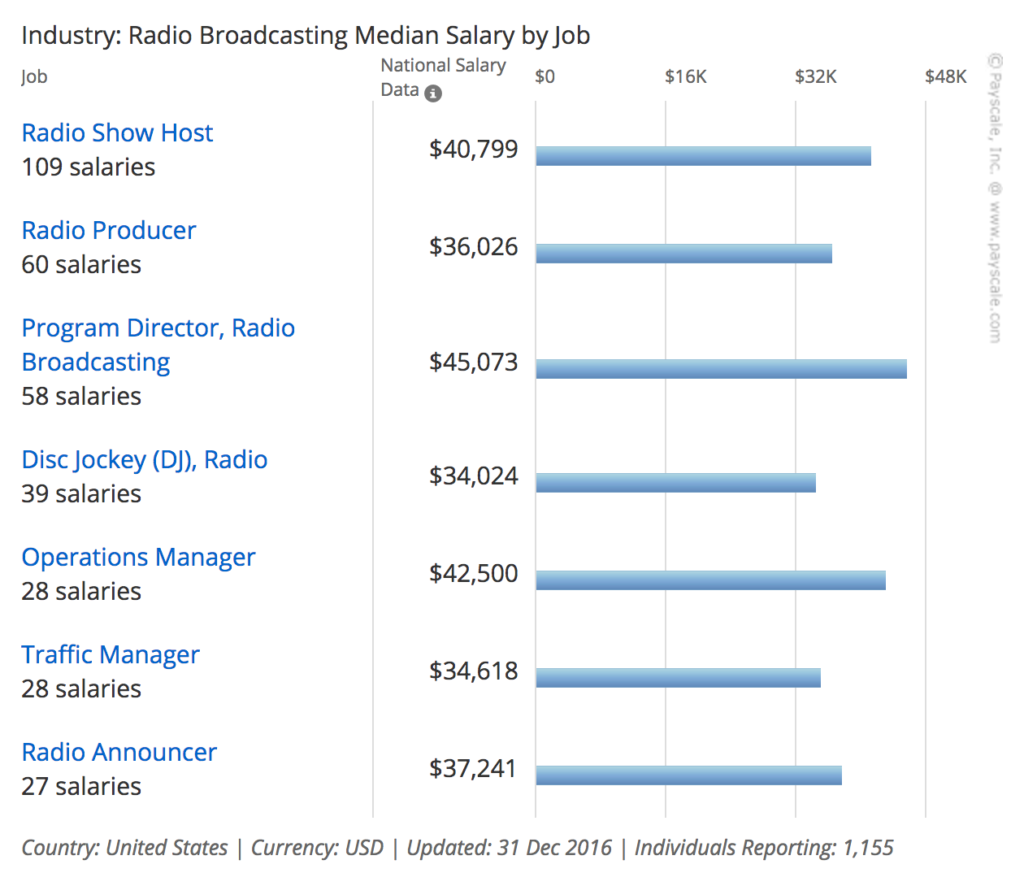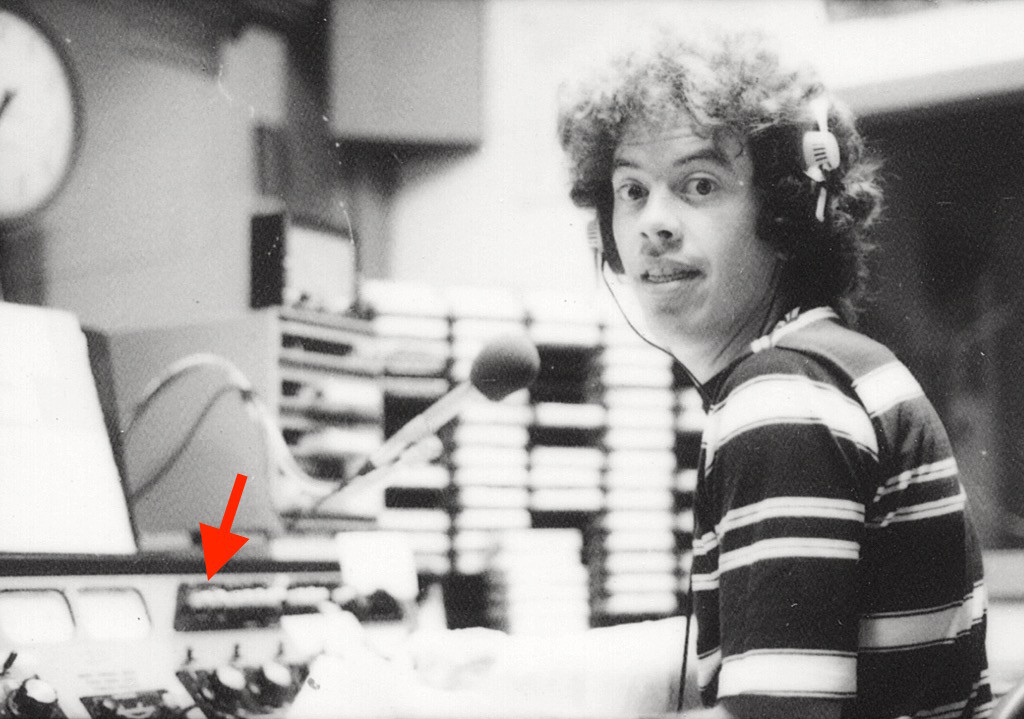Tag Archives: Radio
Average Salary for Industry: Radio Broadcasting
I left my job at a small town radio station in 1984 (now I’m retired) but I often reflect on what might have been. Had I stayed in “radio.” I had the title of Program Director and was making about $14K in 1984. Whew.

Radio: There will be no more new music formats
Mark Ramsey says the last successful new radio format was the Variety Hits format, “Jack.” I barely remember that format (now 15 years old). Mr. Ramsey says there as been no new youth-based format on the radio fail in generations… and there never will be “but because the tastes are so fractured among millennials that there is no popular thread of music that isn’t already absorbed sufficiently well by an existing format.”
I’m not sure who would care about this theory besides someone who programs a radio station. He offers some insight into who listens to which formats and why but it all seems a bit… academic to me. Like reflecting on Mayan culture.
People still listening to radio. Even for news.
“91% of Americans ages 12 and older had listened to traditional AM/FM radio in the week before they were surveyed in 2015, according to Nielsen Media Research. […] In research asking about how people are learning about the U.S. presidential election, 44% of adults said they learned about it from radio in the past week. Radio outpaced both national (23%) and local (29%) print newspapers, although it trailed local TV news (57%) and cable TV news (54%).”
Radio jobs fell 27% since 1990
There are now more Americans working for online publishers and broadcasters than for newspapers, according to data from the U.S. Bureau of Labor Statistics. Employment at online outlets first eclipsed newspapers in October 2015. […] Radio broadcasting jobs fell from January 1990 to March by about 27 percent.
A finite amount of attention
“Perceptual Load Theory states that we have a finite amount of attention and that once that capacity is maxed out, we cannot process anything else. To test whether paying attention to radio traffic reports can be bad for our driving, Gillian Murphy asked 36 people to drive a route in a full-sized driving simulator while listening to a traffic update on the radio.”
Will radio find a home in your next car?
This article says yes (I think). Everyone seems to agree younger listeners are turning to their phones for audio but there are still lots of folks listening to the radio.
Ninety-three percent of U.S. adults listen to radio weekly, according to Nielsen. 96 percent of U.S. adults (and 94 percent of 18- to 34-year-olds) owned a radio in 2008; today, 79 percent of adults do, and just 68 percent of 18- to 34-year-olds do.
The big radio companies are apparently in the shit but that might be the result of some bad business decisions as much as changing listening habits.
iHeartMedia (formerly Clear Channel), the largest radio company in the U.S. with 850 stations, currently trades for just around a dollar a share, down from around $6 last April. The company is loaded down with debt, and restructuring or bankruptcy could be in its future. Cumulus Media, which owns 454 stations, trades at just $0.54 a share, and NASDAQ has warned that its share price is so low it could be delisted. Emmis Communications stock trades under a dollar. And CBS announced last month that it is planning to sell off its radio stations.
I could certainly have done without the CD player in my MINI. And probably the radio but I don’t think that was even an option.
Warren Krech: 40 years behind the mic
Warren (“Krech in the Morning”) Krech is retiring from radio at the end of the month, wrapping up a career that started in 1972. He’s been on the air in Jefferson City, Missouri, since 1984. Almost half a century of getting up every morning at 3 a.m. Be hard to find someone more involved in his community than Warren and it’s hard not think in terms of “end of an era.” He has seen and been part of a lot of changes in radio and talked about them in this 16 minute chat/shoptalk.
When time stands still
In late summer of 1972 I had been “promoted” from baby-sitting the automation that ran our FM radio station to a live shift (3-7 p.m.) on the AM station. I had recorded weather reports for the FM station but being on the air live was intimidating.
Our stations had no affiliation with national news networks so our only source was the Associated Press wire. Every hour the AP teletype would spit out a national news summary, timed to run about five minutes for a typical reader. At our little stations, the announcer on duty did everything, including reading the news at the top of the hour.

At precisely the top of the hour, the FM automation stopped cold for exactly five minutes. The person “running the board” on the AM would throw a switch that “simulcast” the two stations for those five minutes so the same live newscast could go out on both the AM and the FM. At precisely five minutes past the top of the hour, you throw the switch back as the FM automation takes over again.
I found this procedure challenging. More accurately, I found the last 30 seconds challenging. If you were in the middle of longer story you had to find a place to break in order to “make the join.”
After a week or two I started getting comfortable with this operation and then one day I finished reading the news — every story — and looked up at the clock and saw that I was a minute early. I couldn’t flip the switch to send the FM back to automation because it would result in a minute of dead air. The Ultimate Sin for new radio guys.
I don’t remember how I filled that minute. Probably with weather, maybe a couple of “community highlights.” All I really remember was the knot in my stomach and the sense of time dilation.
It’s unlikely that I’ll ever be in a situation where I have to “fill” for a minute. But if I am, I’m going to tell this story.
How to hire radio talent
Mark Ramsey is a “media strategist, researcher and trend-maker.” What we used to call a consultant. Here’s part of his answer to the question: “what qualifications should we be looking for in talent, programming, and sales that are different from today’s conventional qualifications?”
For talent, nothing else will be more important than that talent’s skill and engagement with social media and digital platforms.
Here’s some questions he’d ask before hiring:
- How big is your personal audience, the one you have direct relationships with, as measured by social media?
- How many Twitter followers do you have?
- How big is your Facebook fan page, and how strong is your engagement?
- How many Instagram followers and likes do you have?
- How many YouTube subscribers and total views do you have?
- Do you have a website for your own brand?
- How big is your brand’s personal email list? How often do you send out email? What do you send?
- What podcasts do you produce? How much listenership do they receive? How many podcast subscribers do you have?
“In other words, to what degree do you – the talent – take responsibility for building your own personal brand? And how can you demonstrate the power of that brand to me?”
I think he’s right. As I’ve watch social media grow and evolve I’ve wondered how I would have fared in this new media environment. Glad I didn’t miss the “spinning records” era.
